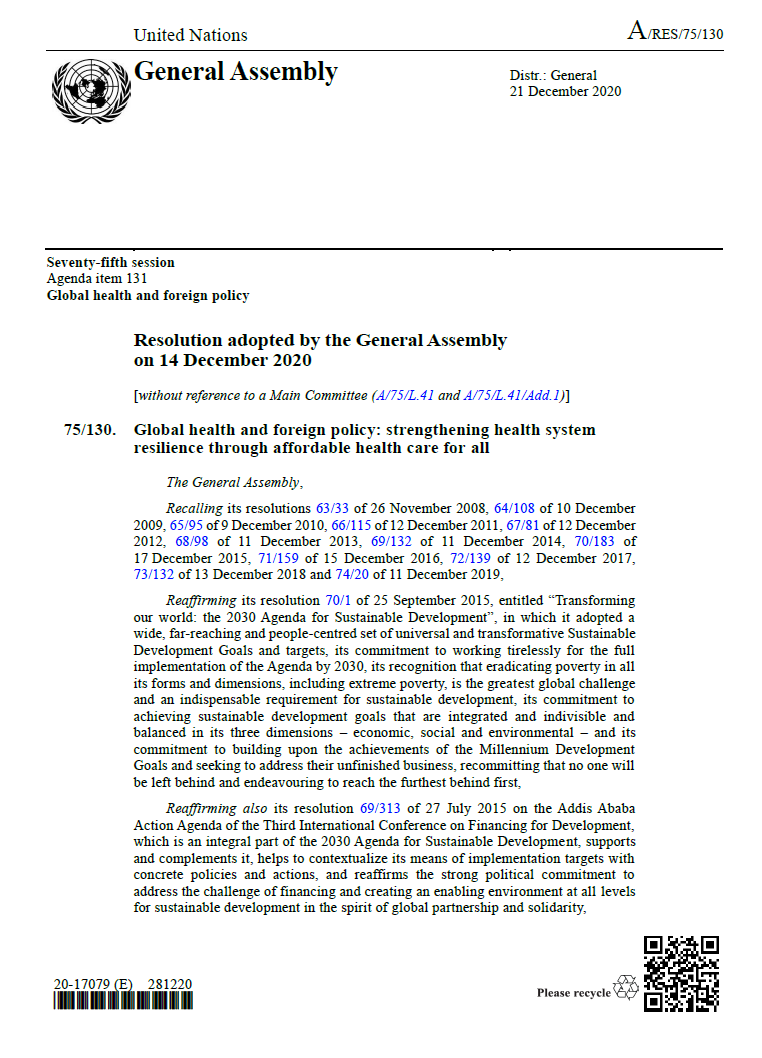2020 Resolution on global health and foreign policy: strengthening health system resilience through affordable health care for all
Analysis of precedential value
This resolution was adopted by the UN General Assembly (UNGA) by a recorded vote of 181 in favor to 1 against in December 2020. The UNGA is the preeminent governing body of the UN system and consists of all 193 UN Member States.
Used as precedent
key population and community leadership
“Recognizing that people’s engagement, particularly of women and girls, families and communities, and the inclusion of all relevant stakeholders is one of the core components of health system governance, to fully empower all people in improving and protecting their own health, giving due regard to addressing and managing conflicts of interest and undue influence, contributing to the achievement of universal health coverage for all, with a focus on health outcomes” (p. 5)
“Urges Member States to strengthen national health systems through ensuring affordable health care for all, with a focus on primary health care, as well as the availability, accessibility and affordability of quality health services and quality, safe, effective, affordable and essential medicines, vaccines, diagnostics and health technologies, with a view to implementing the most effective, high-impact, quality- assured, people-centred, with full respect for human rights, gender- and disability- responsive and evidence-based interventions to meet the health needs of all throughout the life course” (p. 5)
“Further encourages Member States to pursue efficient health financing policies, including through close collaboration among relevant authorities, including finance and health authorities, to respond to unmet needs and to eliminate financial barriers to access to quality, safe, effective, affordable and essential health services, medicines, vaccines, diagnostics and health technologies, reduce out-of-pocket expenditures leading to financial hardship and ensure financial risk protection for all throughout the life course, especially for the poor and those who are vulnerable or in vulnerable situations, through better allocation and use of resources, with adequate financing for primary health care, in accordance with national contexts and priorities” (p. 5)
access to health products
“Reaffirming the right to use, to the fullest extent the provisions contained in the World Trade Organization Agreement on Trade-Related Aspects of Intellectual Property Rights (TRIPS Agreement), which provides flexibilities for the protection of public health and promotes access to medicines for all, in particular for developing countries, and the Doha Declaration on the TRIPS Agreement and Public Health, which recognizes that intellectual property protection is important for the development of new medicines and also recognizes the concerns about its effects on prices” (p. 5)
“Reaffirms the World Trade Organization Agreement on Trade-Related Aspects of Intellectual Property Rights (TRIPS Agreement) as amended, and also reaffirms the 2001 World Trade Organization Doha Declaration on the TRIPS Agreement and Public Health, which recognizes that intellectual property rights should be interpreted and implemented in a manner supportive of the right of Member States to protect public health and, in particular, to promote access to medicines for all, and notes the need for appropriate incentives in the development of new health products” (p. 7)
access to health products, universal health coverage
“Calls upon Member States to ensure access to medicines as one of the fundamental elements of a robust health system based on universal health coverage, and reaffirms that States have the primary role and responsibility to determine and promote their own path towards achieving universal health coverage that ensures universal and equitable access to quality essential health services and access to safe, effective, quality and affordable essential medicines, vaccines, diagnostics and other health technologies for all, without discrimination” (p. 7)
access to health products, publicly funded research
“Calls upon Member States to enhance and build constructive engagement and stronger partnership with relevant stakeholders from the public and private sectors, civil society and academia to pursue access to universal health coverage by improving the availability, affordability and efficiency of health products through increasing transparency of prices of medicines, vaccines, medical devices, diagnostics, assistive products, cell- and gene-based therapies and other health technologies across the value chain, including through improved regulations, in accordance with national and regional legal frameworks and contexts, to address the global concern about the high prices of some health products, and in this regard encourages the World Health Organization to continue its efforts to biennially convene the Fair Pricing Forum with Member States and all relevant stakeholders to discuss the affordability and transparency of prices and costs relating to health products as one of the fundamental features of a robust health system based on universal health coverage” (p. 7)
access to health products, technology transfer
“Encourages Member States, international organizations and other relevant stakeholders to work collaboratively at all levels to develop, test and scale up production of safe, effective, quality, affordable diagnostics, therapeutics, medicines and vaccines, inter alia and as appropriate through the use of existing mechanisms, such as the Medicines Patent Pool, to promote equitable, affordable and timely access to medical products and health technologies in health emergencies” (p. 8)
